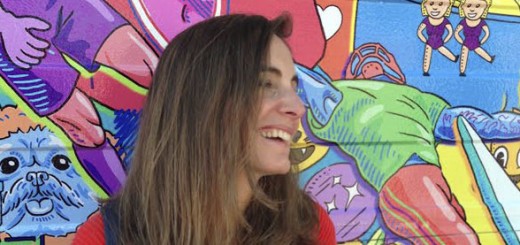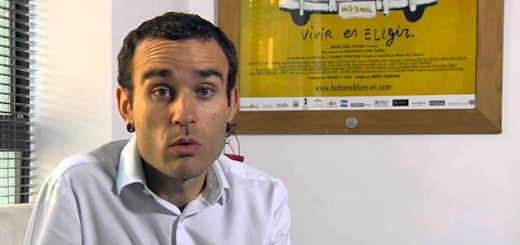Anders Indset: «Busca el conocimiento salvaje y desafía»

Para Anders Indset «todos somos líderes del cambio», tenemos la capacidad para cuestionar y desafiar nuestra «presunta realidad». El primer paso que, de forma individual, permita construir colectivamente nuevos modelos y enfoques que lo desafíen todo.
Este gran filósofo de negocios, autor de «Wild Knowledge – Outthink the Revolution», llega a DES2017 el próximo 23 de mayo para dar una conferencia en la que nos abrirá paso hacia las tendencias del mañana. ¿Su secreto? Una continua búsqueda del «conocimiento salvaje».
¿Estamos entrando en una nueva era para la filosofía? Y si es así, ¿cómo será?
La historia nos enseña, nuestra sociedad siempre reflexiona durante un periodo de tiempo tratando de encontrar un equilibrio, y necesitamos una vida en equilibrio. Nos estamos moviendo de un extremo a otro tratando de encontrarnos.
Podemos ver como una descompensación en síntomas como el de Trump, quien ha sido elegido no por lo que es, sino por lo que no es. Otros extremos como AfD en Alemania o ISIS en el Mundo Árabe son solo pequeños desafíos. Y, estoy seguro que veremos nuevas compensaciones a corto plazo. Habrá otros, trayendo más caos pero también más estabilidad en nuestro mundo. Estamos balanceándonos. Pero, en general nos dirigimos hacia la dirección correcta, llegando a un centro equilibrado. La pregunta clave para nosotros debe ser: ¿Nos estamos moviendo lo suficientemente rápido?
En los próximos años, veremos revoluciones en todas partes. La energía, la ciudad, el consumo y la economía circular será solo el comienzo. Y será el comienzo de la energía infinita; vibrantes Smart Cities, una forma completamente nueva de consumo, donde la sostenibilidad en la economía circular será mucho más importante que tener un nuevo bolso de diseño.
El fin del mundo llegará y aplicaremos nuevas reglas. Todos experimentaremos un nuevo ser, estando más conectados y unidos. El debate alrededor de los refugiados y los móviles es solo un ejemplo de lo que el impacto de la conectividad significará para nuestro mundo y para nosotros como seres humanos. El incremento de las culturas participativas donde el individualismo será reemplazado por el “nosotros” está a la vuelta de la esquina y profundamente anclado en la mentalidad de las generaciones futuras. El egoísmo morirá. La empatía será la nueva norma.
La nueva era es también la era de la filosofía y del conocimiento, de las personas y sus posibilidades. Necesitamos nuevos modelos, nuevos enfoques y nuevos pensamientos. Solo así podremos dominar los desafíos sin volvernos locos y terminando en un centro psiquiátrico.
Tu afirmación “Nuestros líderes hoy necesitan la filosofía del pasado, junto a la ciencia del conocimiento y la tecnología del mañana”. ¿Cómo las combinas?
La respuesta es fácil: necesitamos tiempo para pensar y reflexionar junto con el interés y la curiosidad por la tecnología.
Puedes empezar estudiando filosofía y desafiar tu pensamiento. Necesitamos un cambio fundamental de percepción, en el camino podemos ver el mundo – un mundo que requiere pensamiento cada día. Esto, unido a la curiosidad, construirá “puentes” y nuevos caminos de ver el mundo, nuestra presunta realidad. Si abrimos nuestras mentes, conseguiremos resultados.
Pero esto no acaba aquí. Necesitamos acción, innovación y cambio. Tenemos que actuar y cambiar el estatus quo para ser creativos y alcanzar nuevos enfoques. El tiempo de “hacer esto como lo hacíamos siempre” se ha acabado. Regresa el arte del pensamiento, y la habilidad para cuestionar y desafiarlo todo.
Nuestro mundo está cambiando – y es un cambio rápido. Tenemos que entender que las cosas que hoy son correctas pueden ser diferentes o incluso incorrectas mañana. Un concepto que los primeros filósofos llaman “panta rhei”, que quiere decir que “no se puede entrar dos veces en el mismo río”. Y esto es solo un pequeño ejemplo de la relevancia de la filosofía en el mundo actual.
Tenemos que crear la tecnología que simplifique el mundo, para conseguir más tiempo, aunque digamos «no tengo tiempo». La respuesta es de nuevo simple: “Tómalo”. No habrá un tiempo mejor para comenzar algo que “ahora”. Ten una hora a la semana para pensar. Establece un bloqueo en tu horario semanal, cada semana. De esta forma, su única tarea es no romper la cadena.
“Thinking Time” es tan crucial como correr una maratón o hacer equipo, tienes que intentarlo. Intente algo nuevo, haga frente a sus miedos, intente reír y hacer algo estúpido. No tengas miedo y salta tan alto como puedas de tu zona de confort.
¿Cómo podemos hacer frente a la velocidad del cambio?
Primero necesitamos entender que no hay “final” para la digitalización, no hay transformación digital desde A a Z. Por supuesto, todo lo que puede ser digitalizado será digitalizado, pero digitalizar un mal proceso no ayuda. La tecnología en sí no irrumpe en la industria, pero sí lo que los humanos hacen con la tecnología. Vivimos en tiempos de permanente cambio y nuestro futuro será improvisado, el cambio infinito y las posibilidades están delante. Por tanto, es una mentalidad que debemos afrontar. Necesitamos ser curiosos, permitir el fracaso, para conseguir y entender que estamos en el comienzo del infinito – con cambios infinitos y posibilidades infinitas-. Se requiere más estabilidad pero al mismo tiempo necesitamos tener más caos. Tenemos que tolerar y entender: Si, es infinito, y sí, estamos a tiempo de una mayor eficiencia.
Tu nuevo libro “Wild Knowledge : Outthink the Revolution”, ¿Qué nos llevamos?
El conocimiento es infinito. Solíamos creer que podíamos saberlo todo, hoy buscamos el conocimiento salvaje. Primero, necesitamos entender que no podemos saberlo todo. ¿Qué sabemos realmente? Debemos someter a escrutinio las cosas de las que estamos seguros e identificar lo que realmente sabemos. En su mayoría usamos nuestras experiencias y nuestro conocimiento para encontrar una explicación plausible. Filtramos información que esperamos que sea verdad quedándonos con una única perspectiva. Entonces alguien nos enseña otra perspectiva del mundo y todo comienza de nuevo. El amor hacia la sabiduría no es algo que tenemos, pero sí que buscamos. Estamos en busca del conocimiento e ideas salvajes, una diferente perspectiva del mundo.
Necesitamos encontrar el camino para crear culturas y entornos que supongan una búsqueda del conocimiento salvaje. Y necesitamos hacerlo juntos; parar de ser auto-proclamados expertos y aceptar nuestra interdependencia. No doy la respuesta a las preguntas que todos están buscando, pero intento influir sobre cómo pensamos y reflejarlo. Me gusta incluir a los oyentes y lectores en un viaje hacia el redescubrimiento, para poner la filosofía sobre la mesa.
Anders Indset is one of the leading business philosophers and author of the upcoming book «WILD KNOWLEDGE – Outthink the Revolution». He is a much sought-after international keynote speaker on leadership, change, technology, branding, and creativity. Indset also gives an in-depth understanding of the trends of tomorrow and how leaders can handle the current speed of change and develop a digital mindset.
Mr. Indset, are we entering a new era of philosophy and if so, what will it be like?
History teaches us, our society always overcompensates for a previous period of time trying to find a balance, and we need a life in balance. We are swinging from one extreme to the other and trying to find the righ mix in between.
We can see over-compensating in symptoms such as Trump, who was elected not for what he is but for what he is not. Other extremes like AfD in Germany or ISIS in the Arabic world are only short term challenges. An over-compensation. And, I am sure we will see new short-tem over-compensations. There will be others, bringing more chaos but also more stability in our world. We are swinging. But, in general we are heading in the right direction, getting towards a balanced centre. The key question for us should be: “Are we moving fast enought”.
In the next years, we will see revolutions everywhere. Energy, cities, consumption and the circular economy will only be the beginning. And it will be the beginning of infinity with free energy, vibrant Smart cities, a completely new way of consumption where sustainability in the circular economy will be more important than having a fancy new designer bag.
The world of infinity will be exiting and new rules will apply. We all will experience a state of being more human, being more connected and closer together. The debate around refugees and cell-phones is just a sneak peak of what the impact of connectivity will mean to our world and us as human beings. The rise of participatory cultures where individualism will be replaced by the “we” is just round the coner and deeply anchored in the mindset of the upcoming generations. Egoism will be dead. Empathy will be the new norm.
The new era is also the era of philosophy and will knowledge. It’s the era of people and possibilities. We need new models, new approaches and new thinking. Only this way we will master the upcoming challenges without getting crazy and ending in a physiatrics centre.
You state “Our leaders today need the philosophy of the past, paired with the scientific knowledge and technology of tomorrow”. How do you combine them?
The answer is easy: We need time for thinking and reflecting paired with the interest and curiosity for technology.
You can start by reading up on philosophy and challenge your own thinking. We need a fundamental change in perception, in the way we see the world – a world that requieres thinking every single day. That, paired with curiosity, will build “bridges”, and new ways of seeing the world, our presumed reality. If we open our minds, the results will follow.
But, it doesn’t stop there. We need action, innovation and change. We have to act and challenge the status quo by being creative and coming up with new approaches. The times of “doing it like we have done it always” are over. A revival of the art of thinking, and the skills to critically question and challenge things.
Our world is changing – and it is changing fast. We have to understand that the things that are right today might be different or even wrong tomorrow. A concept early philosophers call “panta rhei”, betther known as “you could not step twice into the same river”. And this is just a small example of the relevance of philosophy in today’s world.
We have created the tecnology to simplify our world, to get more time, yet when you ask people they say “I have no time”. The answer is again simple: “Take it”. There will never be a better time to start something than “now”. Take one hour every week for thinking. Set a blocker in your weekly Schedule, every single week. This way, your only task is to not break the chain. Stick to the hour.
Thinking Time is just as crucial as running the marathon or doing the squads, you need to train it. Try something new, face your fears, try getting laughed at and doing someting stupid. Don’t be afraid and jump as far as you can out of your confort zone far away from where you feel comfortable.
How do we cope with the speed of change?
First we need to understand that there is no “end” to digitalisation, there is no digital transformation from A to Z. Of course everything that can be digitised will be digitised, but to digitise a crappy process does not help. Technology itself does not disrupt industries, but what human beings do with technology does. We live in times of permanent change and our future will be improvised, infinite change and possibilities are ahead. It is therefore a mindset that we need to embrace. We need to be curious, allow for failure, to get and to understand that we are at the beginning of infinity – infinity change and infinity possibilities. More stability is requiered but at the same time we will have more chaos. We have tol et go and understand: Yes it is infinite and yes we will be aiming for more efficiency”.
Your new book,, Wild Knowledge – Outthink the Revolution”, what are some take-aways?
Knowledge is infinite. We used to believe we can know everything, today we seek wild knowledge. First of all, we need to understand that we cannot know everything. What do we really know? We must scrutinise things we were sure of and identify what it is that we really know. Mostly we use our experiences and our own knowledge to find plausible explanations. We filter information that we expect to be true and like this only take on a single perspective. But then someone else shows us another perspective on the world and everything starts a new. The love towards wisdom is not something that we have, but something we seek. We are looking for wild knowledge, wild ideas and a different perspective on the world. We need to find ways to create cultures and environments that support our search for wild knowledge. And we need to do this together. Stop being self-proclaimed experts and accept our interdependency. I do not provide all the answers everyone are looking for, but rather try to influence how we think and reflect. I like to include the listeners and readers on a journey towards rediscovering the art of thinking by putting philosophy back on the table.





